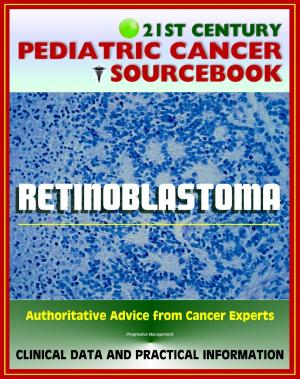21st Century Adult Cancer Sourcebook: Rectal Cancer (Cancer of the Rectum) - Clinical Data for Patients, Families, and Physicians
Nonfiction, Health & Well Being, Health, Ailments & Diseases, Cancer| Author: | Progressive Management | ISBN: | 9781465828972 |
| Publisher: | Progressive Management | Publication: | October 26, 2011 |
| Imprint: | Smashwords Edition | Language: | English |
| Author: | Progressive Management |
| ISBN: | 9781465828972 |
| Publisher: | Progressive Management |
| Publication: | October 26, 2011 |
| Imprint: | Smashwords Edition |
| Language: | English |
Authoritative information and practical advice from the nation's cancer experts about rectal cancer includes official medical data on signs, symptoms, early detection, diagnostic testing, risk factors and prevention, treatment options, surgery, radiation, drugs, chemotherapy, staging, biology, prognosis, and survival, with a complete glossary of technical medical terms and current references.
Starting with the basics, and advancing to detailed patient-oriented and physician-quality information, this comprehensive in-depth compilation gives empowered patients, families, caregivers, nurses, and physicians the knowledge they need to understand the diagnosis and treatment of rectal cancer.
Comprehensive data on clinical trials is included - with information on intervention, sponsor, gender, age group, trial phase, number of enrolled patients, funding source, study type, study design, NCT identification number and other IDs, first received date, start date, completion date, primary completion date, last updated date, last verified date, associated acronym, and outcome measures.
Rectal cancer is a disease in which malignant (cancer) cells form in the tissues of the rectum. The rectum is part of the body’s digestive system. The digestive system removes and processes nutrients (vitamins, minerals, carbohydrates, fats, proteins, and water) from foods and helps pass waste material out of the body. The digestive system is made up of the esophagus, stomach, and the small and large intestines. The first 6 feet of the large intestine are called the large bowel or colon. The last 6 inches are the rectum and the anal canal. The anal canal ends at the anus (the opening of the large intestine to the outside of the body). Age and family history can affect the risk of developing rectal cancer. The following are possible risk factors for rectal cancer:
* Being aged 40 or older.
* Having certain hereditary conditions, such as familial adenomatous polyposis (FAP) and hereditary nonpolyposis colon cancer (HNPCC or Lynch syndrome).
* Having a personal history of any of the following:
* Colorectal cancer.
* Polyps (small pieces of bulging tissue) in the colon or rectum.
* Cancer of the ovary, endometrium, or breast.
* Having a parent, brother, sister, or child with a history of colorectal cancer or polyps.
Possible signs of rectal cancer include a change in bowel habits or blood in the stool. These and other symptoms may be caused by rectal cancer. Other conditions may cause the same symptoms. A doctor should be consulted if any of the following problems occur:
* A change in bowel habits. * Diarrhea. * Constipation. * Feeling that the bowel does not empty completely. * Stools that are narrower or have a different shape than usual. * Blood (either bright red or very dark) in the stool. * General abdominal discomfort (frequent gas pains, bloating, fullness, or cramps). * Change in appetite. * Weight loss for no known reason. * Feeling very tired.
Extensive supplements, with chapters gathered from our Cancer Toolkit series and other reports, cover a broad range of cancer topics useful to cancer patients. This edition includes our exclusive Guide to Leading Medical Websites with updated links to 81 of the best sites for medical information, which let you quickly check for updates from the government and the best commercial portals, news sites, reference/textbook/non-commercial portals, and health organizations. Supplemental coverage includes:
Levels of Evidence for Cancer Treatment Studies
Glossary of Clinical Trial Terms
Clinical Trials Background Information and In-Depth Program
Clinical Trials at NIH
How To Find A Cancer Treatment Trial: A Ten-Step Guide
Taking Part in Cancer Treatment Research Studies
Access to Investigational Drugs
Authoritative information and practical advice from the nation's cancer experts about rectal cancer includes official medical data on signs, symptoms, early detection, diagnostic testing, risk factors and prevention, treatment options, surgery, radiation, drugs, chemotherapy, staging, biology, prognosis, and survival, with a complete glossary of technical medical terms and current references.
Starting with the basics, and advancing to detailed patient-oriented and physician-quality information, this comprehensive in-depth compilation gives empowered patients, families, caregivers, nurses, and physicians the knowledge they need to understand the diagnosis and treatment of rectal cancer.
Comprehensive data on clinical trials is included - with information on intervention, sponsor, gender, age group, trial phase, number of enrolled patients, funding source, study type, study design, NCT identification number and other IDs, first received date, start date, completion date, primary completion date, last updated date, last verified date, associated acronym, and outcome measures.
Rectal cancer is a disease in which malignant (cancer) cells form in the tissues of the rectum. The rectum is part of the body’s digestive system. The digestive system removes and processes nutrients (vitamins, minerals, carbohydrates, fats, proteins, and water) from foods and helps pass waste material out of the body. The digestive system is made up of the esophagus, stomach, and the small and large intestines. The first 6 feet of the large intestine are called the large bowel or colon. The last 6 inches are the rectum and the anal canal. The anal canal ends at the anus (the opening of the large intestine to the outside of the body). Age and family history can affect the risk of developing rectal cancer. The following are possible risk factors for rectal cancer:
* Being aged 40 or older.
* Having certain hereditary conditions, such as familial adenomatous polyposis (FAP) and hereditary nonpolyposis colon cancer (HNPCC or Lynch syndrome).
* Having a personal history of any of the following:
* Colorectal cancer.
* Polyps (small pieces of bulging tissue) in the colon or rectum.
* Cancer of the ovary, endometrium, or breast.
* Having a parent, brother, sister, or child with a history of colorectal cancer or polyps.
Possible signs of rectal cancer include a change in bowel habits or blood in the stool. These and other symptoms may be caused by rectal cancer. Other conditions may cause the same symptoms. A doctor should be consulted if any of the following problems occur:
* A change in bowel habits. * Diarrhea. * Constipation. * Feeling that the bowel does not empty completely. * Stools that are narrower or have a different shape than usual. * Blood (either bright red or very dark) in the stool. * General abdominal discomfort (frequent gas pains, bloating, fullness, or cramps). * Change in appetite. * Weight loss for no known reason. * Feeling very tired.
Extensive supplements, with chapters gathered from our Cancer Toolkit series and other reports, cover a broad range of cancer topics useful to cancer patients. This edition includes our exclusive Guide to Leading Medical Websites with updated links to 81 of the best sites for medical information, which let you quickly check for updates from the government and the best commercial portals, news sites, reference/textbook/non-commercial portals, and health organizations. Supplemental coverage includes:
Levels of Evidence for Cancer Treatment Studies
Glossary of Clinical Trial Terms
Clinical Trials Background Information and In-Depth Program
Clinical Trials at NIH
How To Find A Cancer Treatment Trial: A Ten-Step Guide
Taking Part in Cancer Treatment Research Studies
Access to Investigational Drugs















